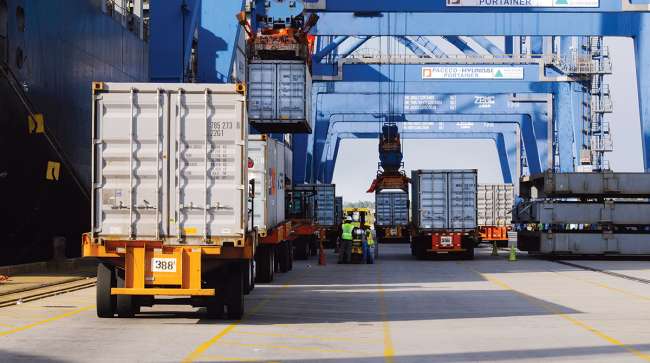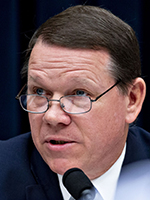Senior Reporter
US House Panel to Examine Supply Chain Nov. 17

[Stay on top of transportation news: Get TTNews in your inbox.]
Ongoing supply chain challenges experienced by commercial ports and freight corridors will be examined when the transportation panel in the U.S. House of Representatives meets for a hearing Nov. 17.
Transportation and Infrastructure Committee leaders plan to review what stakeholders say is a connectivity crisis at ports-of-entry and key commercial hubs. Industries, from manufacturing to retail, are sounding the alarm, weeks before the holidays, about an inability to expedite the movement of goods through critical points on the supply chain.
Representatives from the trucking industry are scheduled to testify before the transportation panel.
This month, American Trucking Associations participated in a roundtable discussion with Republican transportation policymakers to raise their concerns. Trucking’s profile has been elevated as firms seek to expand the workforce to keep up with consumers’ demands. In a statement to Transport Topics, ATA executive vice president of advocacy Bill Sullivan noted, “Truckers are doing their best under increasingly challenging circumstances, and this roundtable was a constructive and detailed discussion of the current state of supply chain challenges across all modes and stakeholders.”

Sullivan
Sullivan added, “If there were just one answer to solve current bottlenecks, our supply chain would be further along already. As we emerge from the pandemic, we welcome the opportunity to engage with policymakers to discuss the difficulties and possible options to overcome them, working together.”
ATA joined nearly 100 groups representing manufacturers and distributors in calling on the Biden administration to further assist with freight connectivity concerns. The groups proposed allowing certain commercial drivers under 21 to operate vehicles interstate, providing workforce flexibility with COVID-19 vaccine mandates, and detailing the cause of supply chain bottlenecks.
In a letter to the president, the groups wrote: “We encourage the administration to continue to investigate the causes of inefficiencies at our nation’s ports, draw input from a wide variety of supply chain stakeholders and work collaboratively to minimize the bottlenecks and operational practices that prevent the seamless movement of cargo through the supply chain.”
In the meantime, Rep. Peter DeFazio (D-Ore.), chairman of the committee, points to potential assistance for the supply chain stemming from the recently passed $1 trillion infrastructure bill.
Rep. Sam Graves (R-Mo.), the transportation committee’s ranking member, has been urging the Biden administration to enhance efforts to facilitate the movement of freight amid supply chain woes. He joined Republican colleagues in promoting policies meant to assist the private sector. As he put it, “The president’s demand for the private sector to ‘step up’ is insulting if this administration doesn’t do the same and ensure that it isn’t supporting and implementing policies that are actually making matters worse.”

Graves
“I would again say to the president: ‘You step up.’ Stop pursuing the numerous burdensome regulations, policies, and spending priorities that are exacerbating this supply chain crisis,” Graves continued.
The White House, acknowledging myriad supply chain concerns, has said help is on the way for industries. Biden’s team has also pointed to the recent passage of a $1 trillion infrastructure bill as a potential source of aid for stakeholders. The legislation, they noted, includes funding to support improvements at ports.
Additionally, the Biden-Harris Supply Chain Disruptions Task Force announced that the U.S. Department of Transportation would allow port authorities to redirect funds to assist with the supply chain. The task force also indicated it would publish a twice-monthly dashboard detailing metrics tracking progress at the ports of Los Angeles and Long Beach. The administration issued guidelines to facilitate the flow of freight at those ports via 24/7 operations.
“We have a chance to make lasting fixes through the [Congress-passed] bipartisan infrastructure deal. The bipartisan infrastructure deal includes a total of $17 billion to improve infrastructure at coastal ports, inland ports and waterways, and land ports of entry along the border,” Deputy Press Secretary Karine Jean-Pierre told reporters Nov. 9. “This is the single-largest federal investment in our ports in U.S. history. And these investments will improve the efficiency, sustainability, and resiliency of these hubs of commerce.”
Want more news? Listen to today's daily briefing below or go here for more info:




